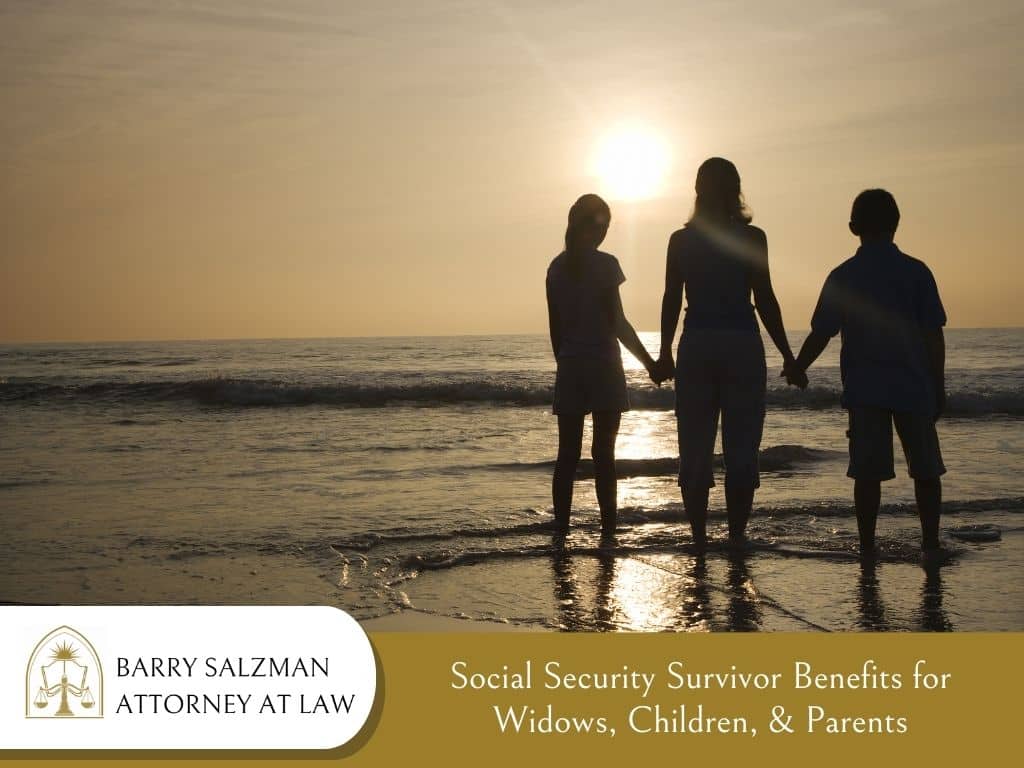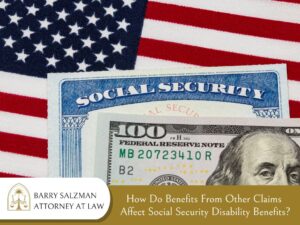Social Security Survivor Benefits for Widows, Children, & Parents

The Social Security Act provides benefits for some survivors of deceased insured workers. To be insured, a person must have 40 quarters (10 years) of earnings credits if age 31 or above (there are different requirements under age 31). Survivors’ benefits may be payable to surviving widows or widowers, children, mother or father, or parent.
Widows and Widowers

Eligibility:
- You must be age 60 or older or at least age 50 but not age 60, and you are disabled.
- The deceased spouse must have been fully insured at death.
- You are not entitled to a retirement benefit that is equal to or larger than the deceased spouse’s full retirement benefit (known as “primary insurance amount”).
- You are not married.
- You are a surviving divorced spouse of the deceased worker if you were married to the deceased worker for at least 10 years just before the date of divorce or were divorced within the 10-year period and remarried the deceased worker within the calendar year after the divorce.
- You have filed an application for benefits.
- You meet one of the following conditions:
- You were married to the deceased spouse for at least 9 months immediately prior to the deceased spouse’s death; this does not apply if the deceased worker’s death was accidental, occurred in the line of duty while on active duty in the military service, you were previously married to the deceased worker and the previous marriage lasted at least 9 months, or the deceased worker was previously married, and the prior spouse had been institutionalized due to mental incompetence and remained so until the prior spouse’s death, and you married the deceased worker within 60 days of the death of the prior spouse;
- You are the mother or father of the deceased worker’s child (regardless of whether the child died after birth);
- You legally adopted the worker’s child during your marriage and before the child reached age 18;
- You were married to the deceased worker when you both adopted a child under the age of 18;
- The deceased spouse legally adopted your child during your marriage and before the child reached age 18.
- Remarriage after age 60 does not disqualify you from a widow(er)’s benefits; remarriage occurs after age 50 and after you become disabled.
Child’s Insurance Benefit

A surviving child is entitled to a child’s insurance benefit under the following conditions:
- The parent died fully or currently insured;
- The child is the child of the deceased parent;
- The child is under age 18 or under age 19 and a full-time student in an elementary or secondary school or age 18 or older and under a disability which began before the age of 22;
- The child was dependent upon the deceased parent;
- The child is not married.
A “child” may be a natural (biological) child or any other child who would have the right to inherit property from the deceased parent under state law (regardless of the provisions in a will), a stepchild (generally must be such for 9 months before the death of a parent), legally adopted child and a child of an invalid ceremonial marriage under certain conditions. To be considered a “natural child” of the deceased worker, the worker must have acknowledged the child as his in writing or has been decreed the parent by a court or has been ordered to pay child support for the child, or has been shown to be the parent of the child by other reasonable evidence that the worker lived with the child and contributed to the child’s support. A dependent grandchild or step-grandchild may also be entitled to benefits.
The surviving child’s benefit is 75% of the deceased parent’s full retirement benefit unless that amount exceeds the “family maximum” if there are multiple persons entitled to survivor’s benefits, in which case the maximum benefit may be prorated.
Mother or Father’s Insurance Benefit

A widow or widower who does not qualify for a widow(er)’s benefit may qualify for a mother’s or father’s insurance benefit if:
- The insured worker died fully or currently insured;
- The mother or father is not entitled to a retirement insurance benefit that is equal to or larger than the father’s or mother’s insurance benefit;
- The mother or father the care of a child of the deceased worker under the age of 16 or disabled who is entitled to a child’s insurance benefit;
- The mother or father is not married;
- The mother or father is not entitled to a widow(er)’s insurance benefit, and you meet one of the following conditions:
- You were married to the deceased spouse for at least 9 months immediately prior to the deceased spouse’s death; this does not apply if the deceased worker’s death was accidental, occurred in the line of duty while on active duty in the military service, you were previously married to the deceased worker and the previous marriage lasted at least 9 months, or the deceased worker was previously married, and the prior spouse had been institutionalized due to mental incompetence and remained so until the prior spouse’s death, and you married the deceased worker within 60 days of the death of the prior spouse;
- You are the mother or father of the deceased worker’s child (regardless of whether the child died after birth);
- You legally adopted the worker’s child during your marriage and before the child reached age 18;
- You were married to the deceased worker when you both adopted a child under the age of 18;
- The deceased spouse legally adopted your child during your marriage and before the child reached age 18.
- A surviving divorced parent is entitled to a mother/father insurance benefit under the following conditions:
- You and the deceased worker were validly married;
- You are not currently married;
- You are not entitled to a widow(er)’s insurance benefit or a retirement benefit equal to or larger than the mother/father’s insurance benefit;
- You have in your care the worker’s child who is entitled to a child’s insurance benefit and is your natural or legally adopted child or a child entitled to a child’s insurance benefit on the worker’s earnings record, and the child is under age 16 or disabled.
- Remarriage after receipt of the mother/father’s benefit will terminate the mother/father’s benefit and prevent any future entitlement based on the deceased worker’s earnings record. Remarriage is not affected if you enter into a same-sex marriage or union. You may be re-entitled to benefits if your remarriage ends by death, divorce, or annulment.
- The amount of the mother/father’s benefit is 75% of the deceased worker’s full retirement benefit.
Parent’s Insurance Benefit

A parent of a deceased insured worker is entitled to a parent’s insured benefit if:
- You are age 62 or older;
- You are not entitled to a retirement insurance benefit equal to or greater than the parent’s insurance benefit;
- You were receiving at least one-half of support from the insured worker prior to the insured worker’s death
- You have not remarried since the insured worker’s death, and one of the following conditions has been met:
- You are the parent and would be eligible to inherit the deceased worker’s property under the laws of the state of the insured worker’s permanent residence;
- You legally adopted the insured worker before he or she turned 16, or
- You became the deceased worker’s stepparent by marriage entered into before the deceased turned 16.
- You are considered a “parent of the deceased worker” if you have the status of a parent under the laws of the state of the deceased worker’s residence with respect to the inheritance of personal property (laws of intestacy).
- The support requirement must be met at the time the insured worker died or at the beginning of a period of disability for the insured worker if it continued until his/her death.
- The parent’s insurance benefit rate is 82.5% of the deceased worker’s retirement benefit (primary insurance amount); if both parents are entitled to a parent’s benefit, each will receive 75% of the deceased worker’s primary insurance amount. These amounts could be reduced if the “family maximum amount” for the deceased worker is exceeded.
- The parent’s benefit ends when the parent dies or becomes entitled to a retirement benefit that equals or exceeds the parent’s benefit, or you marry someone of the opposite gender.
Lump-sum Death Payment
A one-time lump-sum death payment in the amount of $255 is paid to a person entitled to any survivor’s benefit. The application for this benefit must be filed within 2 years of the deceased worker’s death.
Seek Legal Advice and Assistance as Early As Possible
If you need a consultation about your social security benefits claim, Attorney Barry Salzman is here to help. Schedule a consultation or call (727) 334-7547 for legal assistance and to help you navigate your way through the social security disability claim process.
Schedule Your Consultation Today
Navigating the bureaucracy of any disability program is complex and frustrating and often ends in denial.
Don't do it alone! Have a dedicated, experienced advocate on your team.
Fill out the form below or give us a call at 727-321-4993.



